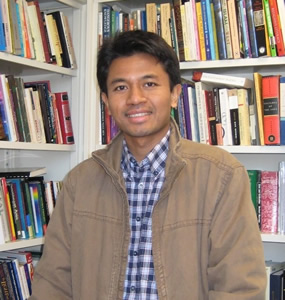Muhamad Ali speaks At PCC
Scholar on Islam and Indonesia comes to PCC
 On Thursday November 8 from 3-4pm, Professor Muhamad Ali will speak in the Cascade Morarity Auditorium.
On Thursday November 8 from 3-4pm, Professor Muhamad Ali will speak in the Cascade Morarity Auditorium.
Born and raised in Indonesia, Ali is Associate Professor of Religious Studies at University of California, Riverside. In 2007, he received his Doctoral degree from University of Hawaii, Manoa in History (Southeast Asia, the Middle East, Europe and World History) and in 2001, his Master’s from Edinburgh University in Islam & Politics. He was a lecturer at the State Islamic University Syarif Hidayatullah, Jakarta. Ali received his B.A. in Islamic studies from the State Islamic University (Indonesia), an MM-CAAE from the University of Indonesia and University of Grenoble Paris.
Specializing in Islamic studies and Southeast Asian Studies, Muhamad Ali has been writing and speaking on jihad, violence and peace, gender relationship, Islam and the West, interfaith dialog and global education, Islam and politics, and religious pluralism. His publications include two books Multicultural-Pluralist Theology (Kompas, 2003), Bridging Islam and the West: An Indonesian View (UshulPress, 2009), articles women and jihad (“Encyclopedia of Women and Islamic Culture,” 2004), fatwas on interfaith marriage in Indonesia (Studia Islamika, 2003), “they are not all alike: Indonesian Muslim Intellectuals’ perception of Judaism and Jews” (Indonesia and the Malay World, 2010), the rise of liberal Islam network in Indonesia (American Journal of Islamic Social Sciences, 2005), categories of Muslims (Moussons, Paris, 2007), moderate Islam in Indonesia (2007), religious pluralism and freedom in Indonesia (2007), and Islam in Southeast Asia (2008). Courses that he teaches include Qur’anic studies, Islam and international relations, Muslim politics, Asian religions, Islam in Southeast Asia, religion, politics and public discourse, peace in the Middle East, and approaches to Islam in Religious Studies.
In the video interview below the following points are covered:
- Discusses some Muslim reactions to a recent anti-Islamic film produced in the U.S. (1:11)
- Explores some Indonesian Muslims’ perspectives of the U.S and free, democratic cultures. (5:13)
- Talks about the Koran and its poetic value, which is compromised in translation. (7:38)
- Responds to the American misconception that violence is part and parcel of Islam: one needs to understand the various contexts of Koranic verses and their “inclusive” and “exclusive” parts; “Arabic” and “Muslim” as terms are often confused; political agendas, foreign policy and the “hypocrisy of the West” are the source of tension. (10:40)
- Returns to “inclusive” and “exclusive” Koranic verses and explains the binary oppositions within them. Uses the different social contexts of Mecca and Medina as examples. (15:46)
- Touches upon the conflation of Judaism and Israel, in reference to anti-Semitic conversations. (19:22)
- Elaborates on the contradictions in the Koran. Notes how scholars reconcile them and find consistency. (21:15)
- Recommends two texts for further reading: Introduction to Islam by Frederick Denny and The Straight Path by John Esposito. (26:05)
Global Crossroads – 06 – Dr. Muhamad Ali
